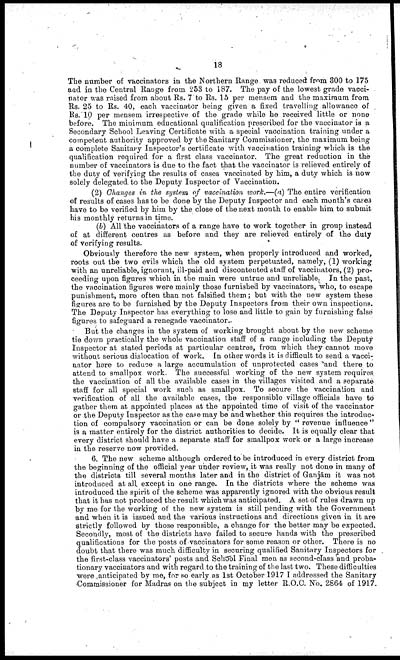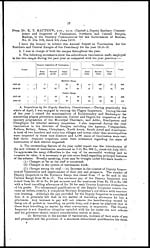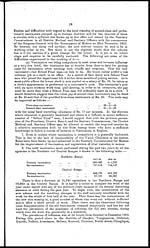Medicine - Vaccination > 1877-1929 - Report on vaccination in the Madras Presidency > Report on vaccination in Madras 1904-1921 > 1918-1919 - Annual report on the vaccination in the Madras Presidency and also on the work of the vaccine section of the King Institute of Preventive Medicine, Madras for the year 1918-19
(463) Page 18
Download files
Individual page:
Thumbnail gallery: Grid view | List view

18
The number of vaccinators in the Northern Range was reduced from 300 to 175
and in the Central Range from 253 to 187. The pay of the lowest grade vacci-
nator was raised from about Rs. 7 to Rs. 15 per mensem and the maximum from
Rs. 25 to Rs. 40, each vaccinator being given a fixed travelling allowance of
Rs 10 per mensem irrespective of the grade while he received little or none
before. The minimum educational qualification prescribed for the vaccinator is a
Secondary School Leaving Certificate with a special vaccination training under a
competent authority approved by the Sanitary Commissioner, the maximum being
a complete Sanitary Inspector's certificate with vaccination training which is the
qualification required for a first class vaccinator. The great reduction in the
number of vaccinators is due to the fact that the vaccinator is relieved entirely of
the duty of verifying the results of cases vaccinated by him, a duty which is now
solely delegated, to the Deputy Inspector of Vaccination.
(2) Changes in the system of vaccination work.—(a) The entire verification
of results of cases has to be done by the Deputy Inspector and each month's cases
have to be verified by him by the close of the next month to enable him to submit
his monthly returns in time.
(b) All the vaccinators of a range have to work together in group instead
of at different centres as before and they are relieved entirely of the duty
of verifying results.
Obviously therefore the new system, when properly introduced and worked
roots out the two evils which the old system perpetuated, namely, (1) working
with an unreliable, ignorant, ill-paid and discontented staff of vaccinators, (2) pro-
ceeding upon figures which in the main were untrue and unreliable. In the past,
the vaccination figures were mainly those furnished by vaccinators, who, to escape
punishment, more often than not falsified them; but with the new system these
figures are to be furnished by the Deputy Inspectors from their own inspections.
The Deputy Inspector has everything to lose and little to gain by furnishing false
figures to safeguard a renegade vaccinator..
But the changes in the system of working brought about by the new scheme
tie down practically the whole vaccination staff of a range including the Deputy
Inspector at stated periods at particular centres, from which they cannot move
without serious dislocation of work. In other words it is difficult to send a vacci-
nator here to reduce a large accumulation of unprotected cases and there, to
attend to smallpox work. The successful working of the new system requires
the vaccination of all the available cases in the villages visited and a separate
staff for all special work such as smallpox. To secure the vaccination and
verification of all the available cases, the responsible village officials have to
gather them at appointed places at the appointed time of visit of the vaccinator
or the Deputy Inspector as the case may be and whether this requires the introduc-
tion of compulsory Vaccination or can be done solely by " revenue influence "
is a matter entirely for the district authorities to decide. It is equally clear that
every district should have a separate staff for smallpox work or a large increase
in the reserve now provided.
6. The new scheme although ordered to be introduced in every district from
the beginning of the official year under review, it was really not done in many of
the districts till several months later and in the district of Ganjām it was not
introduced at all except in one range. In the districts where the scheme was
introduced the spirit of the scheme was apparently ignored with the obvious result
that it has not produced the result which was anticipated. A set of rules drawn up
by me for the working of the new system is still pending with the Government
and when it is issued and the various instructions and directions given in it are
strictly followed by those responsible, a change for the better may be expected.
Secondly, most of the districts have failed to secure hands with the prescribed
qualifications for the posts of vaccinators for some reason or other. There is no
doubt that there was much difficulty in securing qualified Sanitary Inspectors for
the first-class vaccinators' posts and School Final men as second-class and proba-
tionary vaccinators and with regard to the training of the last two. These difficulties
were anticipated by me, for so early as 1st October 1917 I addressed the Sanitary
Commissioner for Madras on the subject in my letter R.O.C. No. 2864 of 1917.
Set display mode to: Large image | Zoom image | Transcription
Images and transcriptions on this page, including medium image downloads, may be used under the Creative Commons Attribution 4.0 International Licence unless otherwise stated. ![]()
| Permanent URL | https://digital.nls.uk/91179270 |
|---|
| Attribution and copyright: |
|
|---|---|




